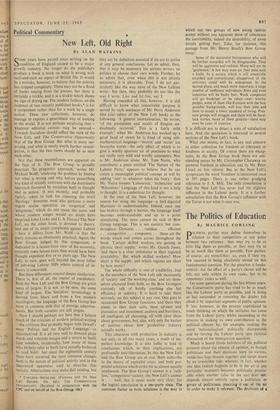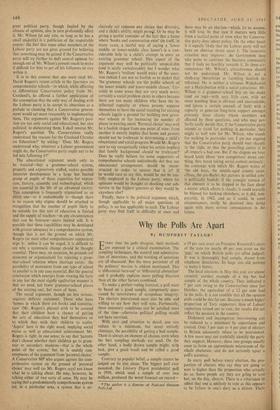The Politics of Education
By MAURICE COWLING
nOLITICAL parties may define themselves in r relation to their competitors ,at any point between two extremes: they may try to be as little like them as possible, or they may try to be as much like them as possible. Few parties, of course, are monolithic: so, even if they try, few succeed in being absolutely united on this fundamental question. Yet the question is funda- mental : for the effect of a party's choice will be felt, not only within its own ranks, but in its opponents' ranks as well.
On some questions during the last fifteen years, the Conservative party has tried to be as much like the Labour party as possible, and in doing so has succeeded in removing the doubts felt about it by important segments of public opinion. It has, however, in the process capitulated to much thinking on which the initiative has come from the Labour party, whilst succeeding in the process in making its own contribution to the political climate by, for example, making the word 'nationalisation' politically disreputable and by forcing the Labour party into rational discussion of the immigration question.
Much is heard (from belittlers of the political process) about the climate of opinion, as though politicians and their decisions were its victims, rudderless logs thrown together and swept down by an irresistible tide; whereas, in fact, whether one idea (which happens to be in the air at any particular moment) becomes politically practic-
able when another (also in the air) does not, depends almost entirely upon a politician, or group of politicians, plucking it out of the air in order to make it relevant. The decisions of a great political party, though limited by the climate of opinion, also in turn profoundly affect it. Mr. Wilson (at any rate, so long as he has a small majority) is a politician of the respectable centre: the fact that some other members of the Labour party are not gives ground for believing that something may be gained if the Conservative party will try further to shift central opinion far enough out of Mr. Wilson's present reach to make it difficult for him to get all his followers to stay within it.
It is in this context that one must read Mr. David Rogers's recent, article in the Spectator on comprehensive schools—in which, while affecting to differentiate Conservative policy from Mr. Crosland's, he offered a further application of the assumption that the only way of dealing with the Labour party is to accept its objectives as a prelude to claiming that a Conservative govern- ment would act more reasonably in implementing them. The arguments against Mr. Rogers's posi- tion are not only social and educational, but also political; in elaborating them, I shall reverse Mr. Rogers's question `Do Conservatives really understand the reasons for the Crosland Circular on Education?' by asking: 'Does Mr. Rogers understand why, whatever a Labour government might do, the Conservative party ought not to be led into following it?'
The educational argument needs only to be restated—that a grammar-school system, properly and expensively staffed, makes possible intensive development in a large but limited group of pupils of those capacities for expres- sion, literary, scientific and technological, which are essential to the life of an advanced society. This conception is frequently stigmatised as an Elitist one—as it undoubtedly is—though there is no reason why stigma should be attached to recognition that the number of pupils likely to be suitable for this sort of education is limited and the supply of teachers—in any circumstances that can be foreseen—more limited still, It is possible that these capabilities may be developed with greater adequacy in a comprehensive system, though that is not the ground on which Mr. Rogers (or most other comprehensive supporters) urge it: unless it can be urged, it is difficult to see why a systematic change should be thought essential. There may, on occasion, be grounds (of economy or organisation) for rejecting a gram- mar-school solution where shortage exists: the possibility of movement from one type of school to another is in any case essential. But the general conclusion which emerges from viewing the facts in any but the most rigidly egalitarian manner is that we need, not fewer grammar-school places of the existing sort, but more of them.
The social argument, though no less serious, requires delicate statement. Those who have 'homes in which there are books and conversa- tion' (Mr. Rogers's phrase) wish to be assured that their children have a chance of getting the sort of education they had themselves or to which they wish their children to aspire. `Aspire' here is the right word, implying social status as well as educational achievement. Mr. Rogers is right, in one sense, to say that 'parents don't choose whether their children go to gram- mar or secondary moderns—that is the whole point of the system,' but he is unduly con- temptuous of the argument from 'parental choice.' A Conservative MP who argues against the com- prehensive system on the ground of 'parental choice' may well (as Mr. Rogers says) not know what he is talking about. He may, however, be talking either of two sorts of sense. He may be saying that a predominantly comprehensive system (or, in a particular area, a system that is ex- elusively so) removes any choice that diversity, and a child's ability, might permit. Or he may be giving a tactful reminder of the fact that a home where 'books and conversation exist' (in itself, in many cases, a tactful way of saying a 'lower middle or, lower-middle class home') is a con- siderable help to a child's attempt to enter an existing grammar school. This aspect of the argument may well be politically unspeakable (and is easily caricaturable), but I wonder what Mr. Rogers's 'realism' would make of the asser- tion (which I am not so foolish as to make) that 'the grammar schools are the public schools of the lower middle and lower-middle classes.' Cer- tainly in some areas they arc very much more; certainly a social problem exists in others because there are too many children who have the in- tellectual capacity or whose parents suppose themselves to have the social standing for existing schools (again a ground for building new gram- mar schools or for increasing the number of places in existing ones). 'Parental choice' may well be a foolish slogan from one point of view; from another it merely implies that home and parents should not be irrelevant in determining a child's educational and social progress. Would Mr. Rogers care to say categorically (what his article implies) that family background should be irrelevant? Does he really believe (as some supporters of comprehensive schools undoubtedly do) that our educational arrangements should be recon- structed in order to ensure that it is? If he would care to say this, would he not be use- fully employed in the Labour party, where his opinions would be thought as shocking and sub- versive in the highest quarters as they would be anywhere else?
Finally, there is the political argument which, though applicable to all major questions of policy, is no less applicable to each. The Labour party may find itself in difficulty at once and there may be an election—which, let us assume. it will lose. In that case it matters very little from a tactical point of view what the Conserva- tive party does about policy. On the other hand, it is equally likely that the Labour party will not have an election thrust upon it. The economic situation may improve: the Government may take pains to convince the business community that it feels no hostility towards it. In these cir- cumstances Mr. Wilson's attractiveness should not be underrated. Mr. Wilson is not a cloth-cap 'rhetorician or rambling Scottish in- tellectual. He is neither a virtuous Wykehamist nor a Hailcyburian with a social conscience. Mr. Wilson is a grammar-school boy on the make (and on top)—with very little cant, with no more humbug than is obvious and unavoidable, and (given a certain amount of luck) with a capacity to generate long-term support amongst precisely those classes whose members are affected by these questions, and who may per- fectly easily decide that, if the Conservative party intends to stand for nothing in particular, they might as well vote for Mr. Wilson, who 'stands for nothing in particular too. I am not arguing that the Conservative party should veer sharply to the right, or that the prevailing centre is in all respects a bad one. But if the slogans we have heard lately about 'new competitors' mean any- thing, they mean taking social context seriously: the contempt with which Mr. Rogers writes of 'the old boys, the middle-aged county coun- cillors, the pre-Butler Act parents in settled jobs. is politically foolish; if the younger version of that element is to be slapped in the face about a matter which affects it closely, it could scarcely be blamed for looking elsewhere, as it did, tem- porarily, in •1962, and as it could, in some circumstances, easily be deceived into doing again with more serious consequences in the future.







































 Previous page
Previous page